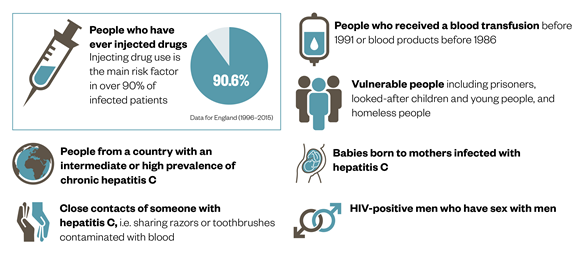Hepatitis C Treatment in Ireland
Search and Compare the Best Clinics and Doctors at the Lowest Prices for Hepatitis C Treatment in Ireland

Find the best clinics for Hepatitis C Treatment in Ireland
No clinics available
Turkey offers the best prices Worldwide
Price: $ 22,731

- Home
- Ireland
WHY US?
At Medijump, we're making medical easy. You can search, compare, discuss, and book your medical all in one place. We open the door to the best medical providers worldwide, saving you time and energy along the way, and it's all for FREE, no hidden fees, and no price markups guaranteed. So what are you waiting for?

Free

Best Price

Widest Selection

Risk-Free
What you need to know about Hepatitis C Treatment in Ireland

Hepatitis C is a viral infection that can cause liver inflammation and lead to serious liver damage. If you have hepatitis C, your doctor will examine your specific condition and make a treatment plan based on the type of the hepatitis C (genotypes), your general condition, and how much liver scarring (cirrhosis) you have.
What does a Hepatitis C Treatment Procedure Involve?
The main treatment options for hepatitis C are antiviral medication and liver transplantation. Antiviral medication is used to clear the virus from your body in at least 8 to 12 weeks. If you have developed a more serious complication, then liver transplantation can be an option. During liver transplantation, you are given a general anesthetic, and then your doctor removes the damaged liver and replaces it with a healthy liver, either from a deceased donor or a living donor.
How Long Should I Stay in Ireland for a Hepatitis C Treatment Procedure?
If your doctor gives you antiviral medication, you may need to stay in Ireland for a few weeks as your doctor needs to monitor how your body is responding to the medication. If you undergo surgery, you are required to spend 5 to 10 days in the hospital and stay in the country for 10 to 14 more days after you are discharged from the hospital.
What's the Recovery Time for Hepatitis C Treatment Procedures in Ireland?
The recovery time depends on which treatment you underwent. With antiviral medication, you should be able to get back to most of your normal routine within a couple of days or as soon as you do not experience any symptoms or side effects from the medication. With a liver transplant, the full recovery period can take around six months, but you should be able to return to work within 12 weeks.
What sort of Aftercare is Required for Hepatitis C Treatment Procedures in Ireland?
Making healthy lifestyle changes is very important after your treatment, such as following a healthy and balanced diet plan and regular exercise. Treatment with antiviral medication requires regular follow-up checkups to monitor your condition and progress. With liver transplantation, you also need regular checkup and you may need to take medication for a longer period of time.
What's the Success Rate of Hepatitis C Treatment Procedures in Ireland?
Antiviral medicine is a safe and effective treatment for hepatitis C, with around 90% of patients with the condition are cured. Liver transplant is generally safe and approximately 70% of patients who undergo the procedure can live for ten years or longer. Both have some side effects and risks, such as depression, anxiety, skin irritation, insomnia, anorexia, tiredness, hair loss, aggressive behavior, bile duct complications, blood clots, bleeding, failure or rejection of donated liver, infection, mental confusion, and seizures
Are there Alternatives to Hepatitis C Treatment Procedures in Ireland?
You will need antiviral medication to treat hepatitis C, but if the infection is diagnosed in the early stages, you may not need treatment immediately. However, you still need to make lifestyle adjustments. Your doctor will have several blood tests to see if your body fights off the virus, if the infection does not continue, you usually do not need treatment.
What Should You Expect Before and After the Procedure
When you have hepatitis C, the virus can damage your liver and you may experience symptoms, such as fatigue, bruising easily, bleeding easily, jaundice, weight loss, dark-colored urine, and more. After treatment, you may be cured and will not experience any of these symptoms anymore.
Whilst the information presented here has been accurately sourced and verified by a medical professional for its accuracy, it is still advised to consult with your doctor before pursuing a medical treatment at one of the listed medical providers
No Time?
Tell us what you're looking for and we'll reachout to the top clinics all at once
Enquire Now

Popular Procedures in Ireland
Prices Start From $50

Prices Start From $35,013

Prices Start From $39

Recommended Medical Centers in Ireland for procedures similar to Hepatitis C Treatment

- Interpreter services
- Translation service
- Religious facilities
- Medical records transfer
- Medical travel insurance
- Health insurance coordination
- TV in the room
- Safe in the room
- Phone in the room
- Private rooms for patients available

- Interpreter services
- Translation service
- Religious facilities
- Medical records transfer
- Medical travel insurance
- Health insurance coordination
- TV in the room
- Safe in the room
- Phone in the room
- Private rooms for patients available

- Interpreter services
- Translation service
- Religious facilities
- Medical records transfer
- Medical travel insurance
- Health insurance coordination
- TV in the room
- Safe in the room
- Phone in the room
- Private rooms for patients available

- Interpreter services
- Translation service
- Religious facilities
- Medical records transfer
- Medical travel insurance
- Health insurance coordination
- TV in the room
- Safe in the room
- Phone in the room
- Private rooms for patients available

- Interpreter services
- Translation service
- Religious facilities
- Medical records transfer
- Medical travel insurance
- Health insurance coordination
- TV in the room
- Safe in the room
- Phone in the room
- Private rooms for patients available

- Interpreter services
- Translation service
- Religious facilities
- Medical records transfer
- Medical travel insurance
- Health insurance coordination
- TV in the room
- Safe in the room
- Phone in the room
- Private rooms for patients available

- Interpreter services
- Translation service
- Religious facilities
- Medical records transfer
- Medical travel insurance
- Health insurance coordination
- TV in the room
- Safe in the room
- Phone in the room
- Private rooms for patients available

- Interpreter services
- Translation service
- Religious facilities
- Medical records transfer
- Medical travel insurance
- Health insurance coordination
- TV in the room
- Safe in the room
- Phone in the room
- Private rooms for patients available

- Interpreter services
- Translation service
- Religious facilities
- Medical records transfer
- Medical travel insurance
- Health insurance coordination
- TV in the room
- Safe in the room
- Phone in the room
- Private rooms for patients available

- Interpreter services
- Translation service
- Religious facilities
- Medical records transfer
- Medical travel insurance
- Health insurance coordination
- TV in the room
- Safe in the room
- Phone in the room
- Private rooms for patients available
Hepatitis C Treatment in and around Ireland
Introduction
Ireland, also known as the Republic of Ireland, is a country located in north-western Europe that occupies 26 of 32 counties on the island of Ireland. The country’s breath-taking landscape, wonderful people, and fascinating history have made it an unforgettable destination for many visitors. Aside from its beauty, more and more people also come to Ireland for high-quality healthcare. The country is a newcomer to the medical tourism market. However, it’s seen as an increasingly attractive destination due to the reasonably priced and high standard of clinical care available in the country. Most foreign patients come for cosmetic surgery and dental treatments, but many hospitals and clinics in the country offer a wide variety of services, such as cardiology, pathology, pulmonary, and gynecology. Also, the Joint Commission International has accredited several hospitals in the country, most of which are located in Dublin.
Popular Cities and Regions in Ireland
Ireland’s capital and largest city, Dublin, is the most popular tourist destination within the country. In fact, it’s the fourth most visited European capital. It’s filled with excellent pubs serving the perfect pint of Guinness, amazing Georgian architecture, and layers of fascinating history. Tourists in this city usually visit the Guinness Storehouse Factory, tour the Old Jameson Distillery, admire the Spire of Dublin, explore Dublin Castle, and marvel at the beauty of St. Patrick’s Cathedral. Another famous city is Cork, which is the second-largest city in the country. It’s a youthful cosmopolitan city packed with artisan coffee bars and snug pubs. Tourists usually come to kiss the Blarney Stone for good luck, enjoy the coastal landscape in Mizen Head, or hike around Gougane Barra. Other popular cities and towns include Galway, Killarney, Kilkenny, and Letterkenny.
Transport in Ireland
The main airport in Ireland is Dublin Airport. It connects the country with numerous cities around the world, including New York, Abu Dhabi, and Hong Kong. Trains and buses are available to travel around the country. However, public transportation is generally sparse in rural areas. Therefore, renting a car is the best mode of transport. Taxis and Uber are available to travel inside major cities.
Visas in Ireland
Ireland has opted out of the Schengen Area. The country allows all EU citizens, as well as citizens of 56 other countries (such as the UAE and the US), to stay without a visa for up to 90 days. Citizens of other countries are required to apply for a visa in advance.
Weather in Ireland
Summer (June – September) provides plenty of sunshine and lower levels of rainfall, with an average temperature of 14°C - 16°C. Winter (October – February) is chilly, with ample rainfall and some snow. Spring and autumn are generally pleasant, with warmer temperatures and more sunshine.
Additional Info
- Local Currency: The official currency is the euro. 1 EUR is approx. 1.08 USD.
- Money & Payments: ATMs are easy to find. Credit and debit cards are widely accepted. Tipping is expected in some places, typically 10% for decent service.
- Local Language: There are several languages used in Ireland. English has been the predominant first language since the late 18th century, but Irish is still widely used by a small percentage of the population.
- Local Culture and Religion: The constitution of Ireland guarantees freedom of religion. Christianity is the largest religion. However, Islam, Hinduism, Judaism, Buddhism, Neo-Paganism, and other religions are present.
- Public Holidays: Some of the most celebrated public holidays are New Year’s Day, St. Patrick’s Day, Easter Monday, Christmas Day, and St. Stephen’s Day.
Popular Searches
- Plastic Surgery in Thailand
- Dental Implants in Thailand
- Hair Transplant in Thailand
- Breast Augmentation Thailand
- Gastric Sleeve in Thailand
- Gender Reassignment Surgery in Thailand
- Laser Hair Removal in Bangkok
- Botox in Bangkok
- Dermatology in Bangkok
- Breast Augmentation in Bangkok
- Coolsculpting in Bangkok
- Veneers in Turkey
- Hair Transplant in Turkey
- Rhinoplasty in Turkey
- Stem Cell Therapy in Mexico
- Rhinoplasty in Mexico
- Liposuction in Mexico
- Coolsculpting in Tijuana
- Rhinoplasty in Korea
- Scar Removal in Korea
- Gastric Sleeve in Turkey
- Bone Marrow Transplant in India
- Invisalign in Malaysia
- Plastic Surgery in the Dominican Republic
- Tummy Tuck in the Dominican Republic
- Plastic and Cosmetic Surgery in Poland
- Rhinoplasty in Poland
- Hair Implant in Poland
- Dental Implants in Poland
- IVF in Turkey